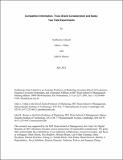Competitive information, trust, brand consideration and sales: Two field experiments
Author(s)
Liberali, Guilherme; Urban, Glen L; Hauser, John R
DownloadEMBARGOED_UNTIL_JULY_2016_Urban_Competitive information.pdf (2.500Mb)
PUBLISHER_CC
Publisher with Creative Commons License
Creative Commons Attribution
Terms of use
Metadata
Show full item recordAbstract
Two field experiments examine whether providing information to consumers regarding competitive products builds trust. Established theory suggests that (1) competitive information leads to trust because it demonstrates the firm is altruistic, and (2) trust leads to brand consideration and sales. In year 1, an American automaker provided experiential, product-feature, word-of-mouth, and advisor information to consumers in a 2 × 2 × 2 × 2 random-assignment field experiment that lasted six months. Main-effect analyses, conditional-logit models, and continuous-time Markov models suggest that competitive information enhances brand consideration and possibly sales and that the effects are mediated through trust. However, in a modification to extant theory, effects are significant only for positively valenced information. The year-2 experiment tested whether a signal that the firm was willing to share competitive information would engender trust, brand consideration, and sales. Contrary to many theories, the signal did not achieve these predicted outcomes because, in the year-2 experiment, consumers who already trusted the automaker were more likely to opt in to competitive information. In addition to interpreting the field experiments in light of extant theory, we examine cost effectiveness and describe the automaker's successful implementation of revised competitive-information strategies.
Date issued
2012-10Department
Sloan School of ManagementJournal
International Journal of Research in Marketing
Publisher
Elsevier
Citation
Liberali, Guilherme; Urban, Glen L. and Hauser, John R. "Competitive information, trust, brand consideration and sales: Two field experiments." International Journal of Research in Marketing 30, 2 (June 2013): 101-113 © 2012 Elsevier B.V.
Version: Author's final manuscript
ISSN
0167-8116